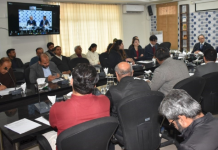ISLAMABAD – In a compelling address at the Institute of Strategic Studies Islamabad (ISSI), former Chief of the Naval Staff, Admiral (R) Zafar Mahmood Abbasi, issued a clarion call for Pakistan to fundamentally recalibrate its national strategy towards the maritime domain, framing it as the nation’s next great frontier for both security and economic survival.
The session, part of ISSI’s Thought Leaders Forum (TLF) and titled ‘Maritime Security and Blue Economy,’ served as a critical follow-up to earlier discussions on the May 2025 India-Pakistan conflict, shifting the lens from continental defense to the vast opportunities and threats presented by the Arabian Sea.
A Continentally-Bound Mindset in a Maritime Century
The forum’s tone was set by Director General ISSI, Ambassador Sohail Mahmood, who starkly outlined the challenges and imperative for change. He emphasized that Pakistan’s significant geo-economic and geo-strategic position is inherently tied to the ocean, a potential that remains stifled by a persistent “continental mind-set.”
Ambassador Mahmood delineated a triad of formidable challenges:
- Intensifying Strategic Competition: Pointing directly to India’s rapid naval modernization as a primary concern, reinforced by recent “provocative statements and aggressive signaling.”
- Rising Non-Traditional Threats: A complex web of piracy, terrorism, trafficking, and the escalating impacts of climate change.
- Geopolitical Contestation: The Indian Ocean has become an arena for major power rivalries, demanding vigilant and agile statecraft.
“Pakistan’s maritime strategy must continue to be extremely vigilant to effectively tackle the emerging challenges and to seize new opportunities,” he asserted.
The Blue Economy: A Sea of Untapped Potential, Hampered by Structural Weaknesses
Beyond security, a central theme was the monumental, yet untapped, potential of the ‘Blue Economy’—the sustainable use of ocean resources for economic growth. Ambassador Mahmood painted a picture of a sector hampered by “inadequate regulatory framework, a fragile institutional setup, limited maritime infrastructure, security concerns, and technological lag.”
He called for nothing less than a national mobilization, urging unprecedented collaboration between the government, the Pakistan Navy, industry, academia, and civil society to unlock this potential and reap rich dividends.
Admiral Abbasi’s Strategic Diagnosis: From Global Divides to National Neglect
Admiral (R) Zafar Mahmood Abbasi, in a wide-ranging and strategic analysis, framed Pakistan’s maritime neglect within a broader global context. He described a world divided between a hegemonic Global North and an inclusive-growth-focused Global South, a dynamic that fuels instability and is acutely felt in the maritime sphere.
He declared that Pakistan’s maritime domain, despite its strategic significance, has been chronically overlooked. On security, he was unequivocal: “The principal threat originates from India, requiring robust seaward defenses and deterrence strategies.” He highlighted a critical strategic gap—the absence of a fully operational Pakistan Navy base at Gwadar.
A Dual Mandate: The Navy’s Role in Defense and Economic Enablement
Admiral Abbasi outlined the Pakistan Navy’s dual role. In peacetime, it advances national interests through vital international collaborations like the Combined Maritime Forces (CMF) and counter-piracy task forces CTF-150 and CTF-151. These efforts combat terrorism, piracy, and drug trafficking, securing sea lanes for global trade.
Economically, the opportunities are staggering. He revealed that Pakistan’s Exclusive Economic Zone (EEZ), expanded in 2015, contains vast untapped resources, including significant oil, gas, and mineral reserves. A revitalized national shipbuilding industry and indigenous shipping fleet could save billions in foreign exchange.
However, sectors like fisheries face severe challenges from overfishing and weak regulation. “Strengthening governance and modernizing infrastructure,” he argued, “could enhance exports and empower coastal communities.”
A Converging Consensus: The Imperative for Integrated Action
The session, introduced by Dr. Talat Shabbir of the China-Pakistan Study Centre, was deemed timely for an “era where oceans play a defining role.” The subsequent lively question-and-answer session underscored the depth of engagement on the issue.
The forum concluded with a powerful, unified message: Pakistan’s future economic prosperity and national security are inextricably linked to the sea. Overcoming structural inertia, fostering inter-institutional coordination, and placing maritime security and the Blue Economy at the heart of national policy is no longer an option, but an urgent strategic necessity. As Admiral Abbasi concluded, the potential is immense, provided the nation can strengthen mutual coordination and maintain an unwavering institutional focus on its blue frontier.
BY: The Times Union








